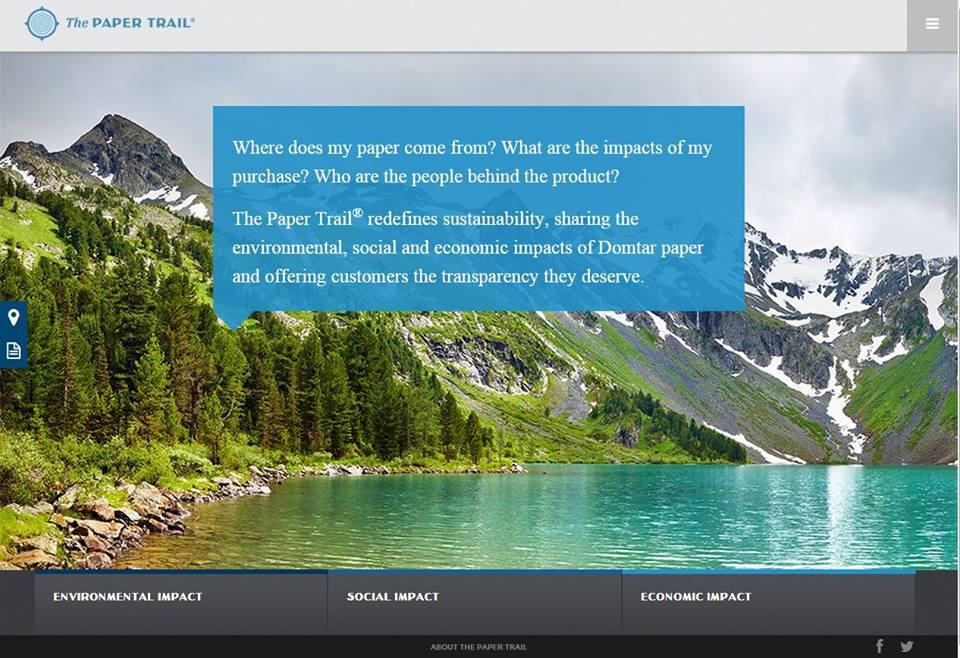
Companies are talking more and more about transparency, but sourcing a product from raw material to the warehouse or store shelf is not always the easiest task. Buyers of office supplies who are interested in the social and environmental impacts of their paper purchases, however, may want to consider checking out The Paper Trail, a Web-based interactive tool that tracks the products coming out of the paper manufacturer Domtar’s 13 mills in North America.
The Paper Trail first launched in 2011, but Domtar recently added social and economic data to the site. Now users can glean more information on how the company operates across it supply chain, from greenhouse gas emissions and renewable energy consumption to local community involvement and charitable donations.
Let’s say you wanted to order 10 rolls of Domtar’s envelopes, and you wanted to an idea of the overall environmental impact of that purchase. You would learn that the paper used in those envelopes was sourced from the company’s Windsor Mill in Quebec. Next, you could see that the pulp used for the envelopes traveled about 140 miles, or equal to the distance between Dallas and San Antonio. The trees felled for pulp would include hickory, fir, elm, ash, birch and maple. About 460 pounds of waste was generated from the manufacture of those envelopes; half of that waste was somehow reused. That order resulted in 1,056 pounds of Scope 1 greenhouse gas emissions and 16 pounds of Scope 2 emissions.
If you are curious about the economic or social impacts of another mill, move west to the Great Lakes region and scope out the company’s Marathon Paper Mill in Rothschild, Wisconsin. The mill has operated in this town of 5,000 for over 100 years, and it's now the largest employer in Rothschild, providing more than 400 jobs. Employees have access to advanced manufacturing education programs and also participate in an annual river cleanup project. Besides its economic multiplier effect it has due to its contracts with other local companies, the company’s employees also serve on the boards of directors of local nonprofits.
Overall, will every data point satisfy all stakeholders? Of course not, but the level of data is a strong suck, and admittedly, it turned into a time suck for me — in a good way as a learning tool.
The Paper Trail is available on desktops, tablets and smartphones, and it incorporates technologies like Google Maps to take users on a geographic tour based on the products selected. And while it is a compelling tool for those vested in learning more about the effects the pulp and paper industry has on the environment, it is also useful to someone who just wants to learn more about the commercial forestry sector. It is also a model for companies who know their customers want to know more about its supply chain, but want to move beyond simply uploading a .PDF report about responsible sourcing to a website — creating an interactive experience that can not only help to retain customers, but attract new ones, too.
Image credits: Domtar Facebook Page
Based in California, Leon Kaye has also been featured in The Guardian, Clean Technica, Sustainable Brands, Earth911, Inhabitat, Architect Magazine and Wired.com. He shares his thoughts on his own site, GreenGoPost.com. Follow him on Twitter and Instagram.

Leon Kaye has written for 3p since 2010 and become executive editor in 2018. His previous work includes writing for the Guardian as well as other online and print publications. In addition, he's worked in sales executive roles within technology and financial research companies, as well as for a public relations firm, for which he consulted with one of the globe’s leading sustainability initiatives. Currently living in Central California, he’s traveled to 70-plus countries and has lived and worked in South Korea, the United Arab Emirates and Uruguay.
Leon’s an alum of Fresno State, the University of Maryland, Baltimore County and the University of Southern California's Marshall Business School. He enjoys traveling abroad as well as exploring California’s Central Coast and the Sierra Nevadas.














